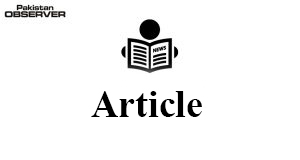Alifiya Aun Ali
ENERGY demand is increasing year after year, for this reason, oil and gas companies due to the increasing depletion of resources and high rate of consumption because of fast-growing and ever-increasing population are increasing the number of exploratory surveys to find new reservoirs at sea. For many years, offshore natural gas and oil production were restricted to shallow waters. However as many older deposits have become exhausted, companies and countries have increasingly moved into deeper waters, into areas where fishery based activities have traditionally played a dominant role in the local and global social economy. Oil and Gas play a major role in a country’s economy and many of the country’s actions and policies are formulated keeping that perspective and standpoint in mind. The fishery is an important industry and has a vital role in the global economy, an employment generating activity and a valued source of food high in nutrition value and food for millions of people around the world. Oil and gas industry is one of the main sources for the global economy. For this reason at present oil and fishing industries need to co-exist by sharing the ocean space. To make the coexistence harmonious and fruitful there is a need to develop clear legislation and efficient maritime spatial plans. Healthy oceans and healthy marine resources are essential to life and world socio-economy. Policies and regulations should not only be based on scientific data but on socio-economic analysis of industries operating in marine areas that depend on marine natural resources for survival.
Recently, we have seen the inclination of the Government of Pakistan to drill and extract the oil from the seabed for the prosperity of Pakistan’s economy but while doing so a few measures should be taken as to avoid disturbing the marine habitat that can result in rescinding of our fishery resources. As several scientific studies indicate that seismic surveys, drilling, location of petroleum platform and ongoing operations related to oil and gas activities at sea have an impact on fisheries in the area. According to the integrated ocean management-fisheries, oil and gas and sea bed mining by FAO, some of the oil gas marine activities’ impact on fish have been identified. Surveying for oil is one of the factors as seismic surveys cause temporary displacement of marine life due to loud noises, temporary displacement can have a major impact if seismic surveys are carried out in spawning grounds during spawning seasons. Another one is the location of petroleum platform; it causes permanent or temporary displacement of marine life from areas around the platform. Potentially a major impact if the platform is located near or in spawning grounds.
The third is the oil spills/blowouts as when this comes in contact with fish larvae, eggs and juveniles can have fatal or non-fatal impacts. Oil spills harm marine life habitat. The use of dispersants to help oil break down has a more negative impact on the environment locally but minimizes the impact at further distances. Since dispersants are highly toxic, they can have a more negative impact than an oil spill if not mixed with oil. The impact on larvae and eggs also depends on the water temperature. Higher temperatures result in more active larvae, and therefore more impact. Further at higher temperatures, more of the oil will evaporate from the sea surface and there may also be a faster microbial degradation of the oil components. Also the on-going operations, displacement, avoidance, change of navigation patterns for marine life around the platforms. Constant water discharge from platform creates local impacts. Level of impact depends on type and concentration of chemicals/pollutants in water. Potential small oil spill near platform has local impact, can cause displacement and have negative developmental effects on larva, eggs and juveniles.
Coexistence between fishery and oil and gas and deep-sea mining industries is prominent as we cannot disregard the fact that in the same way that fishery industry is an important industry at a global level that generates employ and high nutritional value food, oil and gas industry is also an important income source for the world economy. We are a society dependent on sea products but also dependent on oil and gas and petroleum products. Ideally, clean, economical and efficient energy should be used to propel our ships and our industry, but nowadays fishing and oil and gas operations must coexist. To achieve a harmonious coexistence it´s essential a good understanding between both sides and takes steps to minimize the negative impact of oil operations on fishing industries, as well as to adopt, jointly and individually, measures to protect the marine environment to ensure the sustainability of marine resources. Since its creation in 2007, the Integrated Maritime Policy (IMP) has sought to enhance sustainable development and to protect the marine environment by facilitating the cooperation of all maritime players across sectors and borders. Pakistan should implement these frameworks and regulations to fulfil the SDG14 “The Life below Water” which aims to sustainably manage and protect marine and coastal ecosystems from pollution, as well as address the impacts of ocean acidification. Enhancing conservation and the sustainable use of ocean-based resources through international law will also help mitigate some of the challenges faced by our oceans. Leading to economic prosperity and taking Pakistan a step ahead towards the direction of the blue economy.
—The writer is a maritime researcher at National Institute of Maritime Affairs/ NCMPR.










